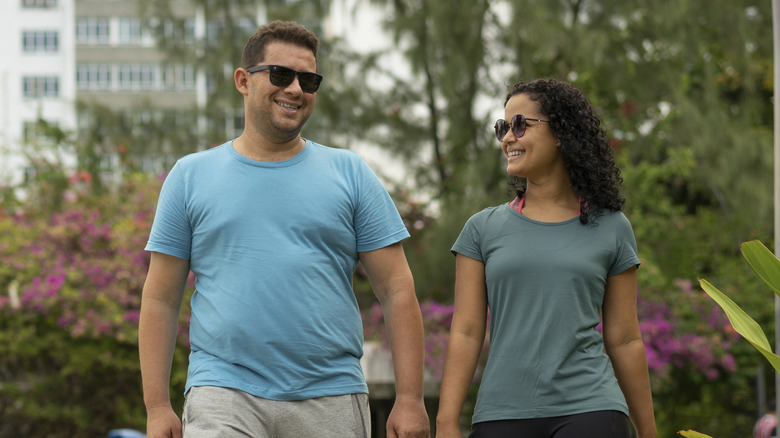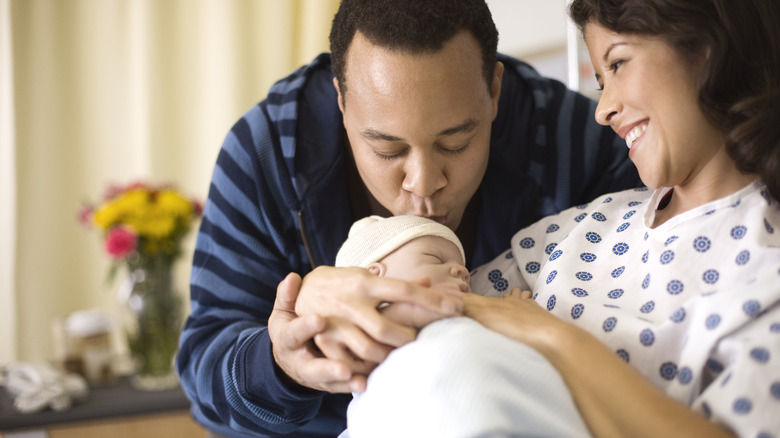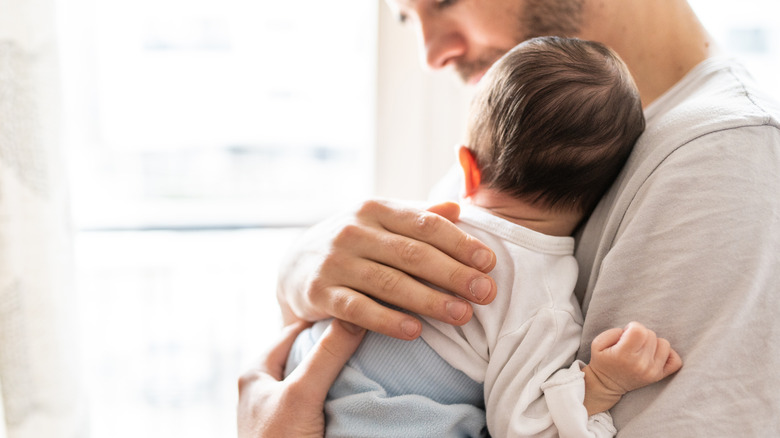The Real Reason Some Women Find 'Dad Bods' Attractive
There's nothing wrong with trying to achieve a great physique if it's something that adds value to your life and keeps you healthy, but you might be intrigued to find that some women actually like some flesh around the middle.
Dad bods have been a hot topic for years now. While Daily News reported in 2015 that a little extra around the middle won't necessarily lead to a flat out rejection by women, a 2021 survey of 2000 singles done by popular dating site Dating.com revealed dad bods to be the participants' primary choice. Nearly 75% of them said that they found them attractive. According to Vox, a "dad bod" can be described as "a nice balance between a beer gut and working out." It is based on the theory that once a man has found a mate and fathered a child, he no longer needs to stress over keeping a sculpted physique. Essentially, the "dad bod" is like the 2 percent version of milk in the dairy aisle — right between the whole and skim options. Here is why some women find this body type attractive.
According to Jennifer Wolkin, a psychologist at the Joan H. Tisch Center for Women's Health at NYU Langone Medical Center, "When women see a man with a 'dad bod,' they think, 'he's a family man,' 'he's a nurturer,' 'he's putting his family before himself'" (via Women's Health).
Men with dad bods might be more caring
There is a possibility that men with dad bods have greater appeal to women because of a more scientific and even evolutionary reason, too.
Professor of anthropology at Yale University, Dr. Richard Bribiescas, who has researched on the topics of men's health, weight, and evolution for his book, "How Men Age: What Evolution Reveals about Male Health and Mortality," told Fatherly, "Testosterone is replaced with estrogen when men put on fat. It's a hormone that promotes more caring behavior — and that's where the whole idea that changes in body fat are a part of paternity come into play." The basic idea is that the biological changes a man goes through after settling down and becoming a father, naturally put him in a better position to be one. But Bribiescas was quick to point out that he wasn't referring to being obese or overweight. "Biologically, just a little bit of weight can make a difference in shifting emphasis from mating opportunities to staying put and paying attention to the family you have in front of you," he explained.
So whether or not you find a dad bod attractive, perhaps the focus with any body type should be health and not weight, as stressed by Dr. Rebecca Busanich, associate professor of exercise and sport studies at St. Catherine University (per Inside Hook). "Culturally, we focus way too much on weight and, in doing so, we've made a lot of mistakes. A lot of people now make decisions around their health with weight as the focus instead of health as the focus."
Has the dad bod trend made fathers a more meaningful group?
Mothers have long held center stage when it comes to how they're viewed, partly owing to the process of childbirth and what that does to their bodies. While nothing can take away from that life-changing journey, dads have become more of a distinct group (thus bridging the gap between how mothers and fathers are viewed), thanks to the dad bod trend, according to a 2018 study published in the Journal of Experimental Social Psychology that involved over 1,100 participants.
The study's author, Erin McPherson of the University of Colorado, Boulder, told Psy Post that previous studies presented mothers as being "more real and meaningful" (more essentialist) than fathers, and this attitude seemed to have evolved, at least according to the 2018 study. "We were curious whether a similar kind of physical change experienced by fathers would cause fathers to be seen as a more essential category, more similar to how mothers are seen. The increasing prevalence of the Dad Bod in popular media and discourse presented an opportunity for us to examine this question," she explained.
The participants of the study were asked to read news pieces about the physiological changes both men and women go through when they become parents. Being enlightened about 'dad bods' seemed to have contributed to fathers ranking higher on essentialism ratings. As explained by McPherson, "When people learn about physiological changes that men experience when they become fathers, they see the entire category of fathers in more essentialist terms, more similarly to how they already see mothers. They see the category of fathers as more permanent, natural, and meaningful."


